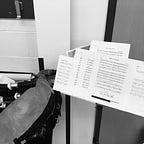James Scott Skinner
There have been, over the years, many great composers of bagpipe music. Many of the great composers were also pipers. George Stewart McLennan, for example, was a master at ceol beag and was known as “the king of pipers.” McLennan’s compositions include notable tunes such as “Dancing Feet,” “The Jig of Slurs,” “Inveran,” “The Little Cascade,” and “The Strathspey King.” The latter tune was written in honor of James Scott Skinner.
James Scott Skinner was not a piper but has made a notable impact on bagpipe music. If you were to peruse the pages of bagpipe music collections or read the tune lists of winning pipe band medleys, you will find his compositions. Skinner was a prolific composer, an accomplished violinist and fiddler, and a dancing master. He was a friend and contemporary of many of the greatest pipers of the late 19th and early 20th centuries, including G.S. MacLennan. He published over 600 compositions. Many of his works, such as “The Cameron Highlanders,” “Sterling Castle,” “The Laird of Drumblair,” and “Hector the Hero” have been adapted to the Highland bagpipe and are popular even today. Skinner’s “musical legacy remains,” James McGillivray notes, “for fiddlers and pipers alike.”
Skinner was born, the youngest of six children, in Arbeadie village near Aberdeen on August 5th, 1843. Skinner’s father, William, was a dance instructor, gardener, and fiddler. The elder Skinner was unable, however, to tutor young James on the fiddle; he died in 1845. The task fell on Alexander “Sandy” Forbes Skinner, James’ older brother, who taught James the violin and the cello. By the time James was eight, he was gigging with local fiddler Peter Milne.
In 1855, Sandy had young James, then eleven, audition for the youth orchestra “Dr. Mark’s Little Men.” James signed up for a six-year apprenticeship with the orchestra. In addition to receiving instruction on the violin and the cello, James traveled throughout Scotland, England, and Wales performing with the group. The “Little Men” gave a command performance to Queen Victoria at Buckingham Place on February 10th, 1858. Skinner, as with all the boys in “Dr. Mark’s Little Men,” were taught to play from memory. When the group was between dates, Skinner studied violin with the noted French violinist Charles Rougier at the orchestra’s home base in Manchester. In addition to teaching Skinner the violin, Rougier also taught Skinner to read music.
Skinner returned to Aberdeen in 1861 and, after a brief gig with the New Orleans Theater Company, he took dancing lessons from “Professor” William Scott. Skinner “got on so well” with Scott, he adapted Scott’s name. Professionally, Skinner became J. Scott Skinner.
Shortly after his lessons with “Professor” Scott, J. Scott Skinner won a sword dance competition in Ireland in 1862. Skinner’s fame began to spread when Skinner won a violin competition in Inverness in 1863. He gained even more notoriety when he published his Ettrick Vale Quadrilles in 1865. By the 1870’s, Skinner was touring the North East of Scotland playing his own compositions as well as those of Paganini and his mentor, Charles Rougier.
Skinner and the noted piper, Willie MacLennan (George Stewart McLennan’s cousin), toured the United States and Canada in 1893. Unfortunately, when the tour arrived in Montreal, Willie died suddenly, succumbing to meningitis. The tour was cut short. Skinner had to rely on the generosity of expatriate Scots to return home. After returning, Skinner stated “I made up my mind on two points. Firstly, I decided to have done with dancing. As a solo violinist I decided to stand or fall.” Skinner also decided to make “the kilt my platform dress.”
During the period between 1865 and 1905, Skinner published ten large volumes of music including The Elgin Collection, The Scottish Violinist, and The Harp and Claymore.
Skinner was well ahead of his time. He recorded performances on cylinder in 1899. His recording career continued until 1922. Many of his recordings are available at the University of Aberdeen’s website. You can hear many of the great pipe tunes played on the fiddle by the composer himself.
Skinner continued to perform throughout his life. In 1911, he helped to open the London Palladium with Harry Lauder, performing as the Caledonian Four.
Scott Skinner died on March 17th, 1927. The funeral cortege was led by the Aberdeen Police Pipe Band. The piper who had honored Skinner with the composition, “The Strathspey King,” George Stewart McLennan played at J. Scott Skinner’s graveside.
Skinner’s musical legacy remains for fiddlers and pipers, “with many a piper playing classic pipe tunes tunes they have no idea were written by one of the greatest Scottish fiddlers.”
Take Action
Cameron Quickstep (with Callum Beaumont)
Laird of Drumblair
Strathspey King
